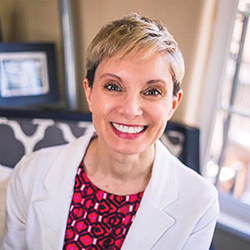Non-Hodgkin Lymphoma Survivor
 When Lynda Wolters, a physically fit 49-year-old paralegal, was diagnosed with mantle cell lymphoma, she and her husband were speechless. After a clinical trial followed by chemotherapy, immunotherapy and many ups and downs, Lynda persevered and is now in remission.
When Lynda Wolters, a physically fit 49-year-old paralegal, was diagnosed with mantle cell lymphoma, she and her husband were speechless. After a clinical trial followed by chemotherapy, immunotherapy and many ups and downs, Lynda persevered and is now in remission.
Reach Out For Support
You are not alone with your thoughts and fears.
Working out, ballroom dancing and eating healthy kept me in good physical shape, so receiving a diagnosis of mantle cell lymphoma (MCL) was shocking. Looking back, I realize I hadn’t felt good for years. Symptoms gradually emerged: digestion issues, difficulty swallowing, exhaustion and then lumps in my neck. My doctor ordered imaging tests, a thyroid and lymph node biopsy, followed by a bone marrow biopsy, which ultimately revealed I had MCL.
MCL is a rare type of B-cell non-Hodgkin lymphoma with a poor prognosis. I was considered “young” for this disease, so my doctor recommended I see an MCL specialist, but there were none in my hometown of Boise, Idaho. I chose a well-known MCL specialist in Houston, Texas.
I was enrolled in a clinical trial using a second-line relapse drug in conjunction with immunotherapy as a first-line treatment. I flew 1,800 miles, sometimes weekly, for eight months to receive the drugs. I finished the trial and began the next phase of treatment, which was inpatient chemotherapy combined with immunotherapy.
While I struggled with the physical side effects of cancer, I also faced emotional challenges. My mother, whom I had expected would be a main caregiver, was ill-equipped for the task. She abandoned me entirely, claiming she could not see me in my condition. All I wanted was my mother’s nurturing. It took years for us to realize she simply did not know how to cope with my disease.
I had similar challenges with friends who stopped calling and coming around. When confronted, they admitted they didn’t know what to say or do to help me. So, I wrote a letter addressing the 800-pound elephant in the room. “I would rather see your face and the pain and fear in your eyes than to have you feel too unsure and awkward to see me,” I wrote. “I am still the same me, the same girl you connected with and formed a relationship with, I am just sick now.” The week after sending it, I had 39 visitors.
One of the best decisions I made during treatment was attending Epic Experience in Colorado for adult cancer survivors. There I was able to share my experiences and came to realize I was not alone with my thoughts and fears. It gave me a shift in perspective. I knew then I needed to share our collective wisdom, so I wrote a book, Voices of Cancer.
Cancer patients tend to keep a lot of their physical, mental and emotional issues bottled up, fearful they will scare off those on the outside of their disease. But these are the exact things caregivers and loved ones need to know. Surprisingly, the clarity that comes with a life-threatening disease is one of the most enlightening experiences many cancer patients may ever have. Personally, I wouldn’t trade the journey, as I am now living my fullest life.
Some lessons Lynda shares in Voices of Cancer:
- It’s okay for the patient and loved ones to be scared.
- Find a doctor who specializes in your type of cancer.
- Be cautious about information on the internet that does not come from a trusted source.
- Not everyone knows how to be a caregiver. Resources and counseling are available.
- Eat when you’re hungry.
- Resources are available to help with transportation, lodging, etc. Ask your doctor, health care team, or advocacy group to connect you.
- Never underestimate the power of sending a note or card; I saved every one I received.
- You may lose your hair in unexpected places.
- Chemotherapy can have unexpected physical and sexual side effects. Ask your doctor what to watch for.
- Cancer-related fatigue is real. Be kind to yourself. Learn to sleep when you’re tired.
- Talk with your doctor about drug holidays. These holidays, if possible, are tremendously helpful.
- The simplest things can mean the most. One of the best gifts I received was from a friend who dropped off homemade jam at my door.
- Research clinical trials, especially if you have a rare cancer.
- “Let me know if you need anything,” is not a helpful statement. I am too sick to know what I need. Be proactive, drop off a meal, visit in the waiting room; five minutes is special!
- Understand you are not alone with feelings of abandonment, loneliness or loss or change in intimacy.
- Find a support system of people with the same cancer as you. They can totally relate, and you will no longer feel you are alone in your own life raft.
- It’s not uncommon to go through the grieving process.
- Keep a notebook or journal handy for writing down your feelings.


